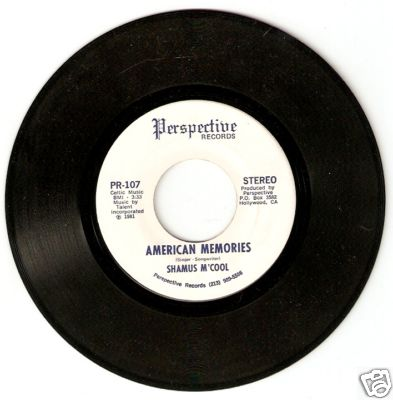
This is it — the Holy Grail of “Ëœ80s music finally makes its appearance at Bottom Feeders. Enjoy another week of artists whose names begin with the letter M, as we continue looking at the bottom three-fifths of the Billboard Hot 100 chart during the Reagan years.
Peter McIan
“Solitaire” — 1980, #52 (download)
This is Peter McIan’s only hit song, off his album Playing Near the Edge. He’s better known as a producer for bands like Mr. Mister and Men at Work and has written a couple books about home recording.
Don McLean
“It’s Just the Sun” — 1981, #83 (download)
This was the last of three singles from McLean’s 1978 album Chain Lightning. The album actually wasn’t released in the U.S. until 1981 after it had experienced some success oversees. Oh, and I hate “American Pie.” Just had to mention that.
Gerard McMahon
“Count on Me” — 1983, #85 (download)
 This was the only charting single from McMahon, off his excellent album No Looking Back. A few weeks ago we had the king of soundtracks, Kenny Loggins. This guy has to be the lost, long-distance fifth cousin of Loggins. He didn’t have any hits from soundtracks, but actually enjoyed making music for movies more than making full albums. He wrote and/or performed songs for Fast Times at Ridgemont High, Spring Break, All the Right Moves, and many more movies and TV shows throughout the years. His most well-known song, though, is probably “Cry Little Sister,” from The Lost Boys (where he’s credited as “Gerard McMann”).
This was the only charting single from McMahon, off his excellent album No Looking Back. A few weeks ago we had the king of soundtracks, Kenny Loggins. This guy has to be the lost, long-distance fifth cousin of Loggins. He didn’t have any hits from soundtracks, but actually enjoyed making music for movies more than making full albums. He wrote and/or performed songs for Fast Times at Ridgemont High, Spring Break, All the Right Moves, and many more movies and TV shows throughout the years. His most well-known song, though, is probably “Cry Little Sister,” from The Lost Boys (where he’s credited as “Gerard McMann”).
Larry John McNally
“Just Like Paradise” — 1981, #86 (download)
This was Larry John McNally’s only charting single, the first song off his debut album. I think he’s more of a songwriter than a performer anyway, having written songs for artists like Rod Stewart and Bonnie Raitt. His crowning moment, though, has to be when Bruce Willis covered his song “Lose Myself” on the Return of Bruno album (1987). What a proud day that had to be.
Shamus M’Cool
“American Memories” — 1981, #80 (download)
Let the heavens open and the light shine through — Shamus M’Cool’s “American Memories” is the Holy friggin’ Grail of “Ëœ80s music.
When I started my “collection” it was to obtain every song that hit the Hot 100 in the “Ëœ80s on CD or vinyl. There’s something close to 4,230 songs that qualify, and I now own all but this track. This is without a doubt the hardest to find of any charting song in the decade, and I’ve even read some collectors and historians proclaim it as the hardest to obtain of any charting song ever.

Having researched this up and down, high and low, for many years now, here’s what I’ve been able to piece together: Shamus M’Cool was a comedian, originally from Boston. He moved to Los Angeles and put out this song on his own Perspective Records. The story is that he sent the song to some major L.A. station (KROQ?) that started to play it. But the person at the station that was really into it went on vacation and the song lost its momentum and never became the hit Shamus expected it to be. He was so mad that he decided not to press any more copies and gave up on it. The word on the street is that he only pressed ten copies. I’ve seen three copies since I started my collection many years ago and know of a fourth. One was on a generic personal ad site listing a collection that included every Hot 100 single ever including “American Memories” as a whole for 300K. The second was last year on e-bay which went for $3,600 and the latest was in early April on e-bay for $2000. I have to admit that I’m happy to see the selling price go down which I take it means demand is going down as well. Therefore one day I might be able to afford a copy. The fourth copy belongs to the Billboard king himself, Joel Whitburn.
So how much of the Shamus M’Cool story is really true? Well, Shamus died at some point (I think in the early “Ëœ90s), so it’s virtually impossible to verify, but I know the general gist of the story above is absolutely true. It seems very hard for me to believe that only one station played this record and yet it got all the way up to #80 on the charts. And I find it hard to believe that only ten copies were made. First off, who prints only ten copies to start with? Secondly, if only ten copies were made back in 1981, I wouldn’t have expected to see even three of them at this point. So who knows, but that’s what I’ve gathered through websites and message boards and people who claim to be “Ëœfriends” of Shamus. So it is what it is and that’s what I’m going with.
As far as the MP3 goes, I obtained it from a guy who we’ll just call “Phil” who obtained it from someone who claims to have obtained it directly from Joel Whitburn. Joel had the guy send a cassette to him and recorded the record onto tape for the guy many years ago. Also fishy, but a fun story true or not.
I consider my collection complete even without this song, because I highly doubt I’m ever going to obtain it. Instead, I’ve filled that void with the original contract that Shamus M’Cool signed to appear on the Mike Douglas Show and perform the song in 1981. One day I would love to dig up a copy of the show, #155 from 3/25/1981 to see the performance. According to the contract, Shamus Mc Cool (yes, that’s how it’s spelled — but Shamus signed it “M’Cool) was to get $98.75 for the day.
So here you are, a listen of quite possibly the rarest song ever to chart. I wonder what kind of sacred code I’m breaking by posting this. Don’t say I never gave you nothin’.
Meat Loaf
“I’m Gonna Love Her for Both of Us” — 1981, #84 (download)
 Clearly the only way to follow up the rarest song of the decade is with Meat Loaf. “I’m Gonna Love Her for Both of Us” was from Dead Ringer, his first album following Bat Out of Hell. It wasn’t the greatest of records, but it was still the Jim Steinman sound, so it surprises me that the album and the song didn’t perform better. Dead Ringer probably never would’ve been made had Meat Loaf not lost his voice and been unable to record the album that Steinman would end up releasing under his own name (and Jim Steinman is not a singer), Bad for Good.
Clearly the only way to follow up the rarest song of the decade is with Meat Loaf. “I’m Gonna Love Her for Both of Us” was from Dead Ringer, his first album following Bat Out of Hell. It wasn’t the greatest of records, but it was still the Jim Steinman sound, so it surprises me that the album and the song didn’t perform better. Dead Ringer probably never would’ve been made had Meat Loaf not lost his voice and been unable to record the album that Steinman would end up releasing under his own name (and Jim Steinman is not a singer), Bad for Good.
Meat Loaf’s career unfortunately took a turn for the worse following this. His 1983 album, Midnight at the Lost and Found, was without Steinman songs after Epic Records refused to pay Jim for them. Meat Loaf could have had “Total Eclipse of the Heart” and “Making Love (Out of Nothing at All)” had this not happened. Instead it was a pretty miserable album, partially written by him and containing none of the epic tracks he was known for.
He released Bad Attitude in 1984 before his 1986 album, Blind Before I Stop, erased him from the musical map. Blind Before I Stop is a completely miserable listen not only due to terrible songs but at least partially thanks to Frank Farian who produced the record and decided to toss ’80s synths under most of the songs and make it sound almost like a dance album. At this point it seemed like his musical career was over — until 1993, of course, when he made one of the most remarkable comebacks in the history of music with Bat Out of Hell II: Back Into Hell.
 Meco
Meco
“Love Theme From Shogun” — 1980, #70 (download)
“Ewok Celebration” — 1983, #60 (download)
I am the only person in this world that has never seen one Star Wars movie.
This is just one of three different ways that Meco charted in the ’80s. We’ve already seen him as “the Cantina Band” from back when we were covering the letter C, and we’ll be seeing him later under S. Of all the weird shit and Star Wars-themed songs that Meco released, none are stranger than “Ewok Celebration,” sung partially in “Ewokese.” Star Wars fans, of course, are going to point out that “Ewok Celebration” was actually in Return of the Jedi and written by John Williams, so the fact that I’m blaming Meco for this is totally unfair, but c’mon, he didn’t have to record a version. I’m sure I think this it’s worse than it is due to my disclaimer above.
Glenn Medeiros
“Watching Over You” — 1987, #80 (download)
“Lonely Won’t Leave Me Alone” — 1987, #67 (download)
“Long and Lasting Love” — 1988, #68 (download)
I actually knew a girl in college whose favorite artist of all time was Glenn Medeiros. Mind you this was around 1998 or so, so we’re not talking in the height of his popularity or anything. I’m just not sure what’s supposed to draw me in to any of these songs. All three are complete snoozers.
Bill Medley
“Don’t Know Much” — 1981, #80 (download)
“Right Here and Now” — 1982, #58 (download)
I apparently have a thing for deep gravely-voiced singers as I could listen to Bill Medley and Joe Cocker all day long. Both of these songs are excellent, but “Don’t Know Much” is a brilliant song made more famous by Linda Ronstadt and Aaron Neville in 1989. Although not all that different, I think this is the best of the three versions to chart in the decade. Version #2 will be coming up next week.
Mel & Kim
“Showing Out (Get Fresh at the Weekend)” — 1987, #78 (download)
Mel and Kim were a British sister act that only was able to release one album — F.L.M. — in 1987. Mel actually died in 1990 from pneumonia which her body couldn’t fight thanks to her chemotherapy for liver cancer. “Showing Out” was their only hit in the US, written and produced by Stock Aitken Waterman. It actually wasn’t even supposed to be a single but neither the group nor the record company really liked the first choice, so this replaced it. Maybe they are British phrases but to this day I still have no idea what “showing out” or “get fresh at the weekend” means.
 John Cougar Mellencamp
John Cougar Mellencamp
“Small Paradise” — 1980, #87 (download)
“Rooty Toot Toot” — 1988, #61 (download)
“Jackie Brown” — 1989, #48 (download)
“Small Paradise” is actually one of my favorite John Mellencamp singles. This was from his self-titled (John Cougar) release in ’79 and was the follow up to his much larger introduction to the charts, “I Need A Lover.” “Rooty Toot Toot” is from Lonesome Jubilee and was originally written as a nursery rhyme for his daughter Teddi Jo who’s actually name checked in the song. “Jackie Brown” was the second single from Big Daddy, his last and weakest album of the decade.
Men at Work
“Everything I Need” — 1985, #47 (download)
“Everything I Need” was the first of four singles to be released from Men at Work’s final album, Two Hearts. The other three (“Maria,” “Man With Two Hearts,” and “Hard Luck Story”) didn’t chart in any format. Colin Hay worked on his solo material after this album.
[kml_flashembed movie="http://www.youtube.com/v/-BhrLCTDPdg" width="425" height="344" allowfullscreen="true" fvars="fs=1" /]
 Sergio Mendes
Sergio Mendes
“Rainbow’s End” — 1983, #52 (download)
“Olympia” — 1984, #58 (download)
I can’t say I know much about Sergio Mendes and Brazil ’66/’77/etc., but I am a huge fan of his commercial peak in the ’80s. “Never Gonna Let You Go” is one of the best love songs ever written, and the follow-up, “Rainbow’s End,” is wonderfully catchy. The vocals on the track are sung by Danny Sembello, a popular songwriter during the ’80s and brother of Michael Sembello. “Olympia” was the theme for the 1984 Summer Olympics in Los Angeles and sung by Joe Pizzulo, who was also the voice on “Never Gonna Let You Go.”
QUICK HITS
Best song: Bill Medley, “Don’t Know Much”
Worst song: Meco, “Ewok Celebration”
Next week we revist “Don’t Know Much,” get superfunky with a very underrated R&B band, and take a look at the artist with the biggest drop-off from good to total crap.
Thanks for reading the entire post! As a reward, here’s an extra song for you.




Comments